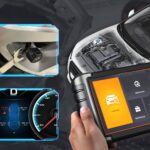Criminals are constantly evolving their tactics to outsmart law enforcement and steal vehicles. As car manufacturers and security agencies enhance anti-theft systems, thieves are turning to sophisticated technologies to bypass these measures. Recent reports from the National Insurance Crime Bureau (NICB) highlight emerging threats in the form of devices like the Flipper Zero and RFID cloning kiosks, which utilize radio frequency (RF) technology to potentially steal cars.
The Flipper Zero, a multi-functional handheld device, has raised concerns due to its ability to interact with various wireless signals, including radio frequency (RF), near-field communication (NFC), and RFID. While not inherently illegal, the Flipper Zero’s capabilities make it a potential tool for car theft. This device can intercept, record, and potentially mimic key fob signals. By capturing a vehicle’s key fob signal, a thief could use the Flipper Zero to unlock and start the car. The threat extends beyond vehicles, as the device could also be used to replicate garage door opener signals, granting access to both a vehicle and a home. While measures have been taken to remove the Flipper Zero from major online marketplaces like Amazon due to security risks, it remains available through other channels.
Current vehicle security systems, particularly in newer models, employ rolling codes which change with each key fob use, making it harder for devices like Flipper Zero to be effective. Older vehicles with fixed numeric codes are more vulnerable to this type of RF scanner attack. However, as technology rapidly advances, the effectiveness of rolling codes against sophisticated RF hacking tools may be challenged in the future.
Another significant concern highlighted by NICB is the rise of RFID cloning kiosks. These kiosks can copy or clone the RFID signals found in key fobs and key cards. RFID technology uses radio frequencies for short-range wireless communication, commonly used for access control. These kiosks function by physically scanning a key fob or card and creating a duplicate. The process can range from a quick 15-minute duplication to a longer process of several days with mail delivery. Some kiosks also offer the ability to store RFID scans and share them through applications.
Although RFID scanning technology itself is legal, the increasing availability of these kiosks in public locations like retail stores and gas stations raises concerns about potential misuse for criminal purposes. Thieves could exploit these kiosks to clone stolen key fobs, or those obtained from rental cars, to steal vehicles later. The ability to copy key cards also poses security risks for businesses and government agencies, potentially allowing unauthorized access to sensitive areas. Furthermore, some kiosks can create RFID copies in sticker form, which could be discreetly used for illicit activities.
Beyond Flipper Zero and RFID kiosks, NICB also points to other technologies that could be exploited for vehicle theft. Apple AirTags, designed for tracking personal items, could be misused by thieves to track target vehicles. By placing an AirTag on a car, a thief could monitor its location and steal it when it’s parked in a more convenient location, such as the owner’s residence. Key programming devices, intended for automotive professionals, also present a threat. While costly and potentially difficult to acquire without suspicion, these devices can be used to program new keys for vehicles. Criminals have reportedly targeted dealerships to steal newer, high-value vehicles using such devices.
These emerging threats from RF scanner technology and related devices are a serious concern for vehicle security. NICB, along with law enforcement and government agencies, is actively working to understand and counter these methods. Raising public awareness about these evolving car theft techniques is crucial in preventing vehicle crime. By staying informed and taking appropriate security measures, car owners can play a vital role in protecting their vehicles from these new technological threats.

